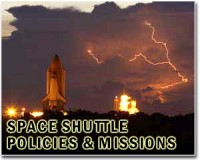 |
Cape Canaveral, Florida (AFP) Feb 24, 2011 Discovery, NASA's oldest and most journeyed space shuttle, is poised to launch Thursday on its final mission to the International Space Station, wrapping up a near three-decade legacy of orbital travel. When the storied spacecraft lifts off at 4:50 pm (2150 GMT), it will mark the beginning of the end of the US space shuttle program, with Discovery the first of the remaining three shuttles headed for retirement this year. The closure of the shuttle program will leave a gaping hole in the American space mission, forcing astronauts to rely on the Russian Soyuz space capsule for transport to the orbiting ISS. But concerns for the future were brushed aside as excitement mounted for Discovery's mission, with technical checks moving along smoothly and no hint of the fuel tank woes that delayed the launch in November. The process of loading the external fuel tank was complete by mid-morning and clear blue skies over Florida boosted the weather forecast to 90 percent favorable for launch. "Teams are not working any technical issues that would prevent us from launching on time," said NASA spokesman Allard Beutel. The crew plans to deliver the Permanent Multipurpose Module, with extra storage space and an area for experiments, as well as some spare parts and the Express Logistic Carrier, an external platform for large equipment. The shuttle will also bring the first humanoid robot to the ISS. The Robonaut 2, or R2, is a joint project of General Motors and NASA and will stay behind as a permanent resident of the space station when Discovery leaves. Cracks on Discovery's bright orange external fuel tank emerged just before launch more than three months ago, causing engineers to puzzle for many weeks over the cause and how to fix it. In January, they agreed that installing small metal strips, called radius blocks, on the 6.7-meter- (22-foot-) long U-shaped aluminum brackets would reinforce their strength. Discovery has broken new ground multiple times in its 27-year career. It transported the Hubble Space telescope, and was the first shuttle to be commanded by a female astronaut. The shuttle was also the first to return to space after two major disasters, the Challenger explosion in 1986 and the Columbia disaster in 2003 when the shuttle broke up on its return toward Earth. Rachel Wiedemann, a Boeing lead engineer charged with monitoring the shuttle's thermal protection shield, said the launch will be an emotional time. "This is the vehicle I am closest to, that I have the most experience working with," said Wiedemann. "It's my baby." Watching Discovery blast off for a final time will be "a bit sad for me but launch in general is such an exciting time," she said. The six astronauts in the crew were expected to board the shuttle at around 1:35 pm (1835 GMT). The mission will be led by commander Steven Lindsey, pilot Eric Boe and astronauts Alvin Drew, Michael Barratt, Steve Bowen and Nicole Stott. Astronaut Tim Kopra was scratched from the crew list after a bicycle accident in January. He was replaced by Bowen. Hours before Discovery was scheduled to lift off, the European space agency's Automated Transfer Vehicle-2, or ATV-2, docked with the ISS. The robot freighter was laden with seven tonnes of supplies and automatically teamed up with the ISS after an eight-day orbital flight covering about four million kilometres (2.5 million miles). Final flights for the other two shuttles remaining in the US fleet, Atlantis and Endeavour, are scheduled for later this year. Endeavour is set for its final takeoff on April 19 and a last mission for Atlantis is scheduled for June 28, though funding for Atlantis remains in question. There were initially five space shuttles in the fleet -- Challenger exploded shortly after liftoff in 1986 and Columbia disintegrated on its way back to Earth in 2003. The sixth shuttle, Enterprise, did test flights in the atmosphere but was never flown into space. It is already on display at a museum outside Washington. Discovery has flown more missions than any other shuttle, circling the Earth more than 5,600 times and logging 142 million miles (230 million kilometers) over its 352 days in space.
Share This Article With Planet Earth
Related Links Shuttle at NASA Watch NASA TV via Space.TV Space Shuttle News at Space-Travel.Com
 Discovery shuttle poised for final launch
Discovery shuttle poised for final launchCape Canaveral, Florida (AFP) Feb 24, 2011 Discovery, NASA's oldest and most journeyed space shuttle, is poised to launch Thursday on its final mission, wrapping up a near three-decade legacy of orbital travel. When the storied spacecraft lifts off at 4:50 pm (2150 GMT), it will mark the beginning of the end of the US space shuttle program, with Discovery the first of the remaining three shuttles headed for retirement this year. ... read more |
|
| The content herein, unless otherwise known to be public domain, are Copyright 1995-2010 - SpaceDaily. AFP and UPI Wire Stories are copyright Agence France-Presse and United Press International. ESA Portal Reports are copyright European Space Agency. All NASA sourced material is public domain. Additional copyrights may apply in whole or part to other bona fide parties. Advertising does not imply endorsement,agreement or approval of any opinions, statements or information provided by SpaceDaily on any Web page published or hosted by SpaceDaily. Privacy Statement |